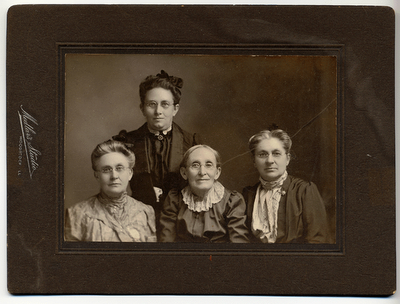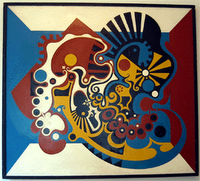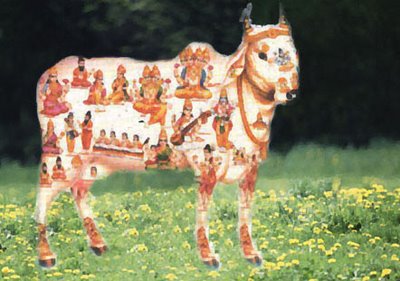Sophie Was Worried About the Farm
 Sophie (seated to the right) was worried about the farm. The men in the field never seemed to accomplish much and the crops were coming in weedy and wilted. It wasn’t just the ill-effects of a long, dry summer; it was the men’s fault. If times were different, she and her sisters could send the men away and tend to the farm themselves. She could plow a field, sow the seeds, and reap the crops just fine without anyone’s (likely inept) help. But sadly, they lived in the wrong era for that kind of nerve and independence. Maybe someday the suffragette movement would secure a woman’s right to vote and a woman’s right to own property, but Sophie knew that day would come long after the men had blown it and let the farm go to hell.
Sophie (seated to the right) was worried about the farm. The men in the field never seemed to accomplish much and the crops were coming in weedy and wilted. It wasn’t just the ill-effects of a long, dry summer; it was the men’s fault. If times were different, she and her sisters could send the men away and tend to the farm themselves. She could plow a field, sow the seeds, and reap the crops just fine without anyone’s (likely inept) help. But sadly, they lived in the wrong era for that kind of nerve and independence. Maybe someday the suffragette movement would secure a woman’s right to vote and a woman’s right to own property, but Sophie knew that day would come long after the men had blown it and let the farm go to hell.Like her sister Sophie, Mildred (seated to the left) believed she was as capable, if not more, than most men she knew. However, Mildred’s strength was her intellect. Mildred was an avid reader and had educated herself well over her lifetime. Thanks to Godey’s Lady’s Book, she knew about poetry and literature as well as sewing and women’s arts. Mildred knew that idle hands are the devil’s workshop so she let the men have their run of the farm. It didn't matter that they didn't do it well; it kept them out of trouble. It was a bonus that it also kept them out of her way. On her best days, without anyone wandering through the house wondering what time supper was being served, Mildred could turn out three or four doilies and still have time for reading. Of course, now that her hair was turning gray her hands were less dexterous with her tatting and her eyes often grew weary from hours of reading, but her work kept her busy and kept her mind off trifles such as men.
Eunice, the mother of the girls (seated in the middle) didn’t know what all the fuss was about. Give her a good pipe and a warm blanket, and she had all she needed. She knew where the men hid their corn liquor and she didn’t care. In fact, she might even sneak out to that old barn and have a nip herself when they weren’t looking. Let them have their fun, and she would have hers. The crops would take care of themselves.
But Inez (standing) had other ideas. She had dreamed once about a very large horse. In her dream she was riding the horse bareback and she was wearing trousers and she rode the horse western style. The horse ran fast and she could feel its muscles rippling beneath her legs, and its power felt good. Although she never wore her hair down loose in public, in her dream her hair flowed in the wind behind her and she felt free. Inez was pretty sure that the dream had something to do with getting out of Illinois. Maybe after this damn photographer was finished she would tell her mother she was moving out West. And maybe Carl, the hired hand, might want to go with her.
photo: I don't recall their names, but the old woman in the middle is my grandmother's great grandmother. The women with her are her daughters. They were all God-fearing women who never dreamed about horses or running the farm on their own.




